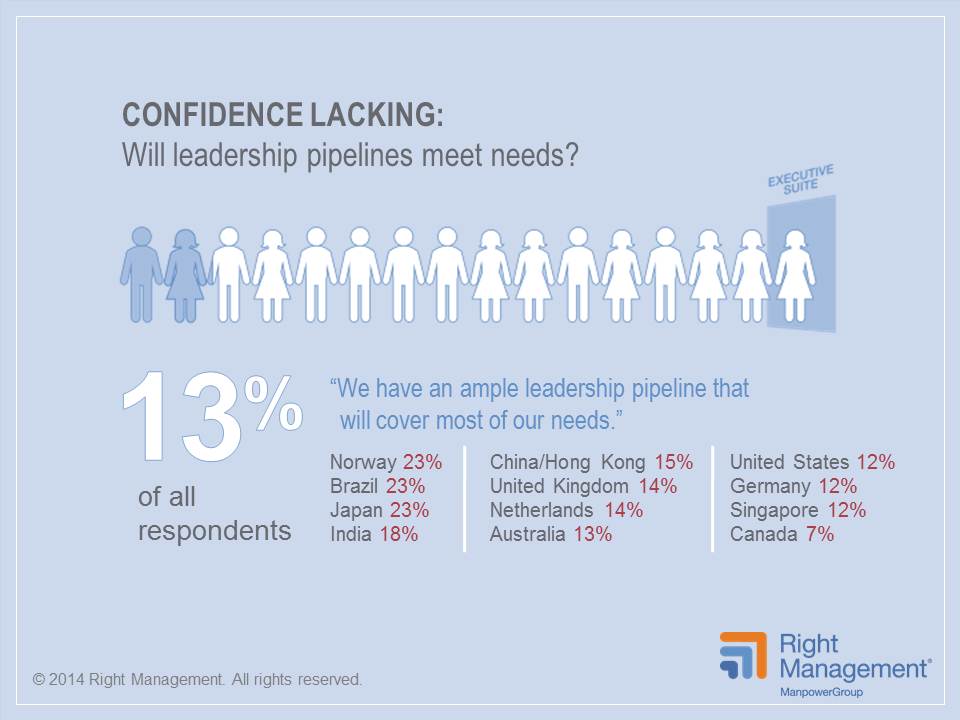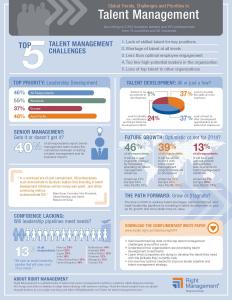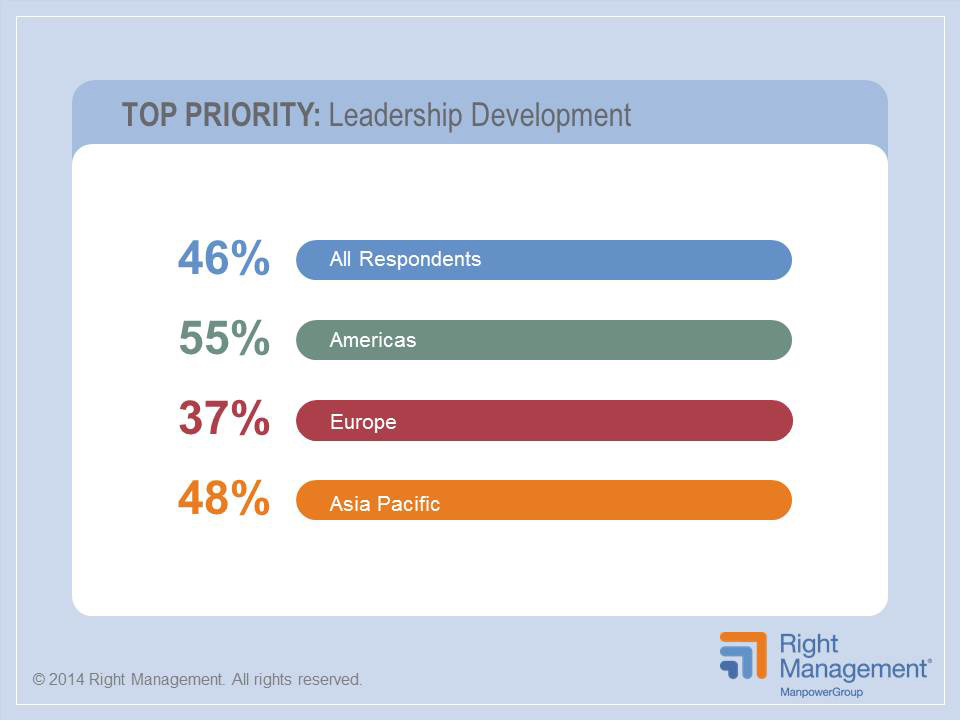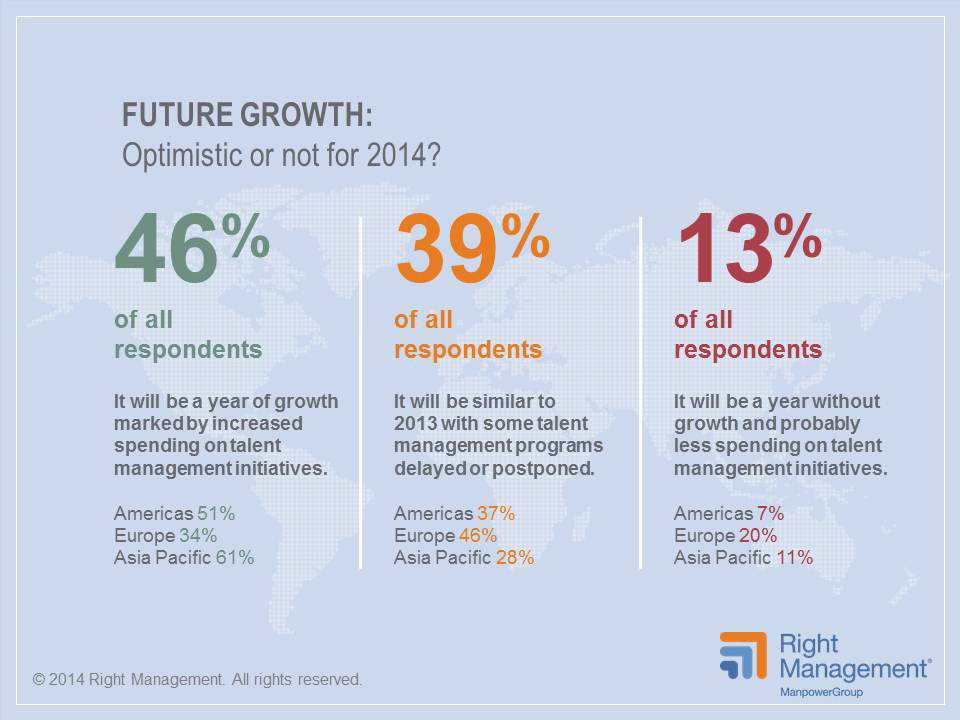Senior HR Executives Identify Leadership Development as Top Priority for 2014
Too Few Organizations Have Confidence in Leadership Pipeline, Reports Right Management Study
Among U.S. HR decision makers, 48 percent report that 2014 will be a year of growth marked by increased spending on talent management initiatives to help develop leaders and build talent pipelines. HR leaders in China/Hong Kong (88 percent), India (77 percent), Brazil (75 percent) and the United Kingdom (45 percent) also plan increased investments in talent management programs.
“Boardrooms around the world are recognizing the critical role human resources has in driving competitive advantage,” said Ruediger Schaefer, Group Executive Vice President EMEA and Global Talent Management for Right Management. “Today’s optimism for growth is limited by a lack of organizational agility, and employers are seeing the impact of the financial cuts and cost reductions that placed talent development on the back burner. As a result, too many companies are facing talent shortages, skills mismatches and weak leadership pipelines that threaten business growth. Future success is dependent on a sustained strategic commitment to assessing, developing and activating talent.”
Other key findings from the Right Management study on talent management include:
- Globally, the top three talent management challenges: lack of skilled talent for key positions, shortage of talent at all levels and less than optimal employee engagement.
- Forty percent of respondents report their senior management team “gets it” and makes the connection between investing in talent management and its business impact.
- Forty-eight percent of global employers plan to broaden their employee engagement programs to keep top talent on staff – the highest response (59 percent) came from employers in Asia Pacific, with 85 percent of employers in China/Hong Kong reporting plans to broaden employee engagement.
- In the Americas, management succession planning ranks as a higher priority (36 percent) than it does in Europe (17 percent) and Asia Pacific (31 percent).
- Both Brazil and France report assessment of skills throughout the organization as the top talent management initiative for 2014, while Australia and the Netherlands cite team building and China/Hong Kong report executive coaching as top priorities.
Additional research conducted by ManpowerGroup focuses on talent shortage. Released in May, the ManpowerGroup 2014 Talent Shortage survey reveals that 36 percent of more than 37,000 employers globally are experiencing difficulty filling open positions due to a lack of available talent with the right skills. As part of that survey, the top 10 hardest jobs to fill globally can be found here.
“Persistent talent shortages and our hardest jobs to fill lists should be a wake-up call for employers who want to keep those skilled individuals on staff,” said Schaefer. “Employee development and engagement is essential to sustaining the best teams to drive competitive advantage.”
Across all regions, nearly one third of HR leaders identify a lack of skilled talent for key positions as the single most pressing talent management challenge facing organizations. In China/Hong Kong, more than 50 percent report this as the most pressing talent management challenge.
Right Management’s Talent Management: Accelerating Business Performance study draws on the results of an online survey of 2,221 senior leaders and human resource executives from 13 countries. The data was gathered at the end of 2013 by a third-party research expert. The full white paper can be obtained by emailing Kate Huskin at [email protected].
Right Management: http://www.right.com/about-us/default.aspx
ManpowerGroup: http://www.manpowergroup.com/wps/wcm/connect/manpowergroup-en/home/why-manpowergroup/capabilities-and-expertise/#.U7rWJfldU0J
Media Contact:
Kate Huskin
+1 414.906.6253
[email protected]













